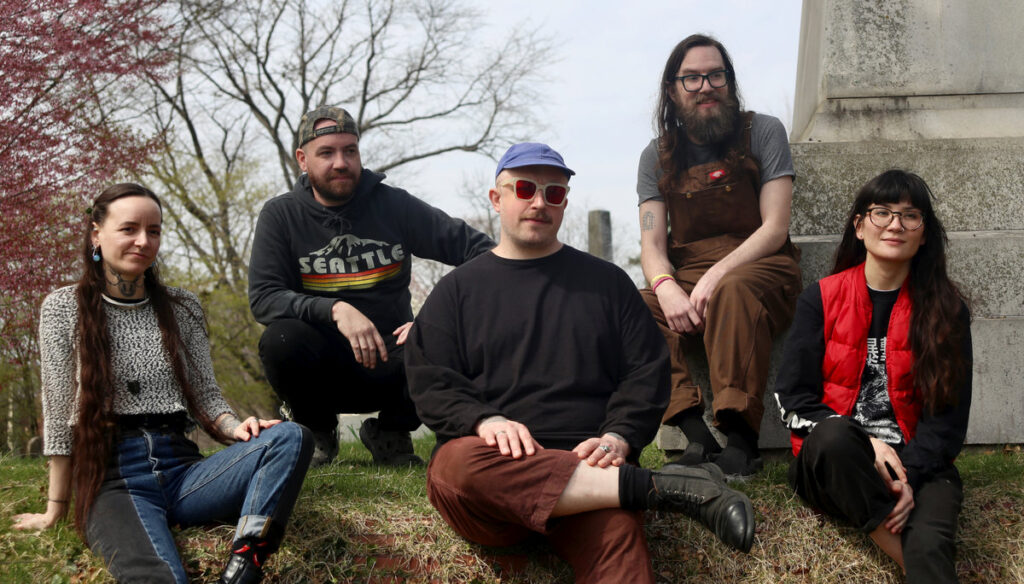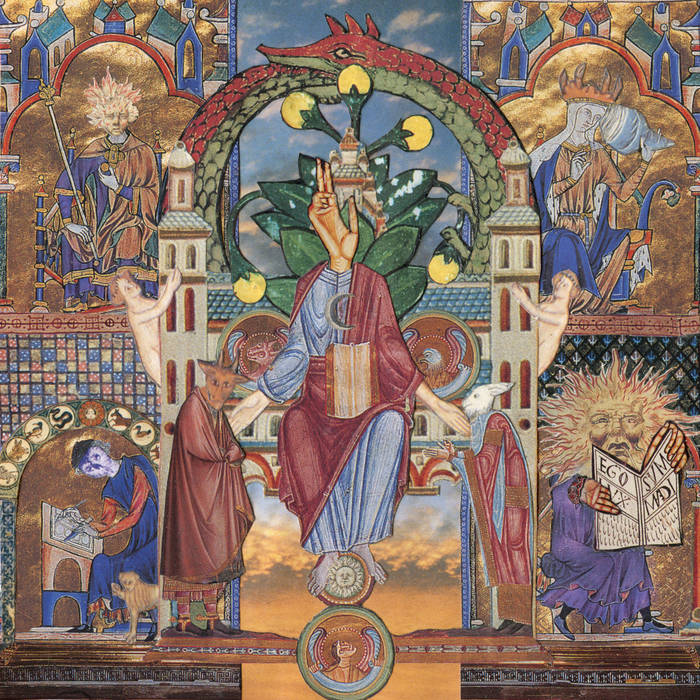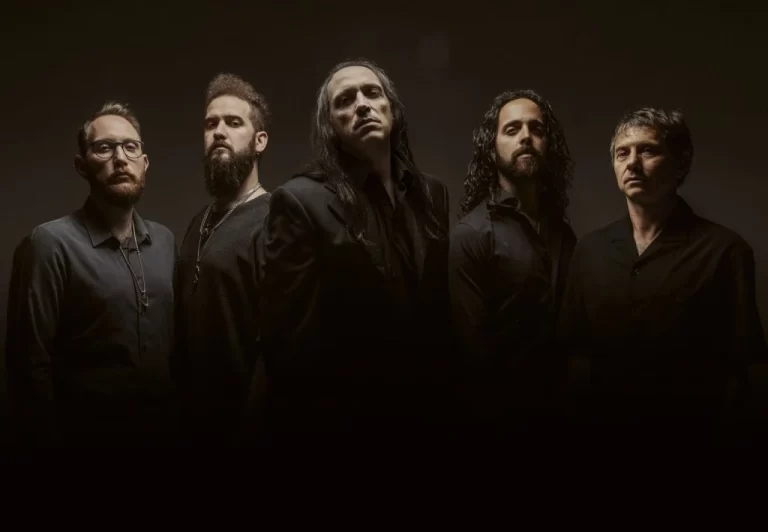Earlier this year, indie-folk stalwarts On The Water released their first full-length album in a decade – the aptly titled Return. A wonderfully eclectic record, it harks back to the early 90s when bands such as Meat Puppets, Butthole Surfers, and Low regularly played with their listeners’ expectations, simply making great music that shared only raw authenticity at its core. We caught up with Fletcher VanVliet to discuss the making of the album and the challenges of returning to an increasingly fractured industry.

All proceeds from physical and digital sales are going towards Philadelphia aid organisations – given the costs of being a musicians, how does that impact your ability to record and perform?
Fletcher: We get a lot of joy playing and that’s always been the primary motivator. I think Strange Monos model is really refreshing. We believe in the power of mutual aid. The world is going to need more and more of it. I don’t think art should be about capital. Money helps but it’s definitely not the motivator.
Like so many bands, you struggled with finding the right label – how did you come to Strange Mono and what do they bring to the table?
Fletcher: We struggled to find any label at all to release our music. It’s pretty hard to market a band that has no idea what kind of band it is. Artists can get pretty far with a DIY model these days, but unfortunately, none of us are particularly good at hyping ourselves or engaging with social media on an impactful level. I think we got really lucky with Strange Mono. We found a record label as genre chaotic as we are that we also genuinely like as people. They work very hard and have offered so much help and support to us.
You made your way to return via a succession of EPs – were the EPs a way to test the water, so to speak, as your sound continued to evolve?
Fletcher: We spent a lot of years trying things. And there was a lot of discarded material that never made it out to the public. I’m not sure that we were ever satisfied with any of it, but what you hear on those EPs I would call the best of the prototypes. I think what we were aiming for and ultimately fell short of was the sound that you hear on this record. Or this is the closest we’ve come so far.
The actual process of recording this album started in 2017 – how do you feel it has evolved since then?
Fletcher: The record we set out to make was a completely different thing. I had written a concept album that we scrapped fairly early on. After that fell apart, we had cobbled together some sort of a record by 2021 but we wanted to do better. A few things survived. It was very liberating to let the rest of it go. When we started fresh, our trajectory started to make sense. We needed to fail a lot to get here.
How much of a challenge is it now for an indie / DIY band to make their way in the world? It feels, certainly in the UK, as if music is in danger of becoming the preserve of those who have the money to play, record, and tour.
Fletcher: It does feel like the art life is in danger. It takes a certain scrappiness, whatever money you can get your hands on, working as little as possible at whatever job so you can focus on the real work. Cost of living has gotten so insane, it’s much harder to get established now. It took me decades to build something sustainable for myself. And still nearly every extra penny I make goes into making records. I’m still living paycheck to paycheck in my 30s. I’ll do this as long as I need to. I’m a lifer.
The album has a wide range of influences, how does the writing process start? Is it one or two members bringing ideas to the rest, or do you all present songs for possible inclusion?
Fletcher: I do my best writing alone, usually just puttering around my house and picking up a guitar every 20 minutes or so to see if I can catch anything. David Lynch always described the process as fishing and I like that. Most of it comes in a burst, you have to sit and be present when the channel opens. Try not to overthink it. Kind of a strange process. After that first stage, I will usually tinker on a piece for a while. Eventually when the band works on something it changes ownership and belongs to the group. Where we land is always miles away from where I began.
The sound of the record is lovely – raw, but with plenty of depth and separation – how was the album recorded?
Fletcher: Thank you. We did this record with Jeff Zeigler at Uniform Recordings. I am a huge fan of live tracking. Not only does it save a ton of money but I think it’s often a part of what makes classic records sound raw and human. It’s a great foundation. Jeff really helped the band build on our sound and go further. Evan also co-produced this record, she has a work ethic like no other, it had a huge impact.
I always ask about sequencing, because it’s such an important part of making an album as opposed to a collection of songs. Especially as Return was conceived over such a long period, was it a challenge to sequence it and develop the journey you wanted the listener to take?
Fletcher: I can get pretty obsessive over the fine details. I try not to get carried away. I definitely want the record to feel inviting. I suppose it’s a greater challenge when you have a band covering so many styles. The old songs were especially hard to place. Overall I’m pretty happy with it. At a certain point you just have to let it be.
Are there any key sources of inspiration for the lyrics?
Fletcher: I don’t often write with a clear intention. Although I will usually end up writing about the problems and ideas that I have been obsessing over. I guess that my brain is trying to work it all out in a state of half consciousness. It’s also often reflective of the media I’ve been consuming. Beyond that, I’m not really sure. Honestly, sometimes I feel like a passenger to the whole process.

Who produced the wonderful, evocative artwork? And how involved were the band in its development?
Fletcher: That is very kind of you. I made this piece while we were mixing the record. It’s about a 5″ x 5″ collage that I spent about 50 hours on it. Most likely more than half of that time is just me staring at the pieces and trying to imagine a grand context for the imagery. This cover was meant to represent our spirit as a band but there are also other little stories that run parallel with the albums themes. I’m not a strong visual artist so collage has become a preferred method for me. It’s almost like solving a puzzle.
How do you plan to promote Return? Any European shows on the horizon?
Fletcher: We used to tour a lot. I think if we found our audience, we’d be on the road all the time. We love to perform. But for now, the reality is one of limited resources. We’ve got a couple more music videos on the way. We enjoy making those. And we’re hoping to hit the road in the states for a couple weeks in the spring. Now, if some kind soul would go ahead and book us a European tour, we’re there.



